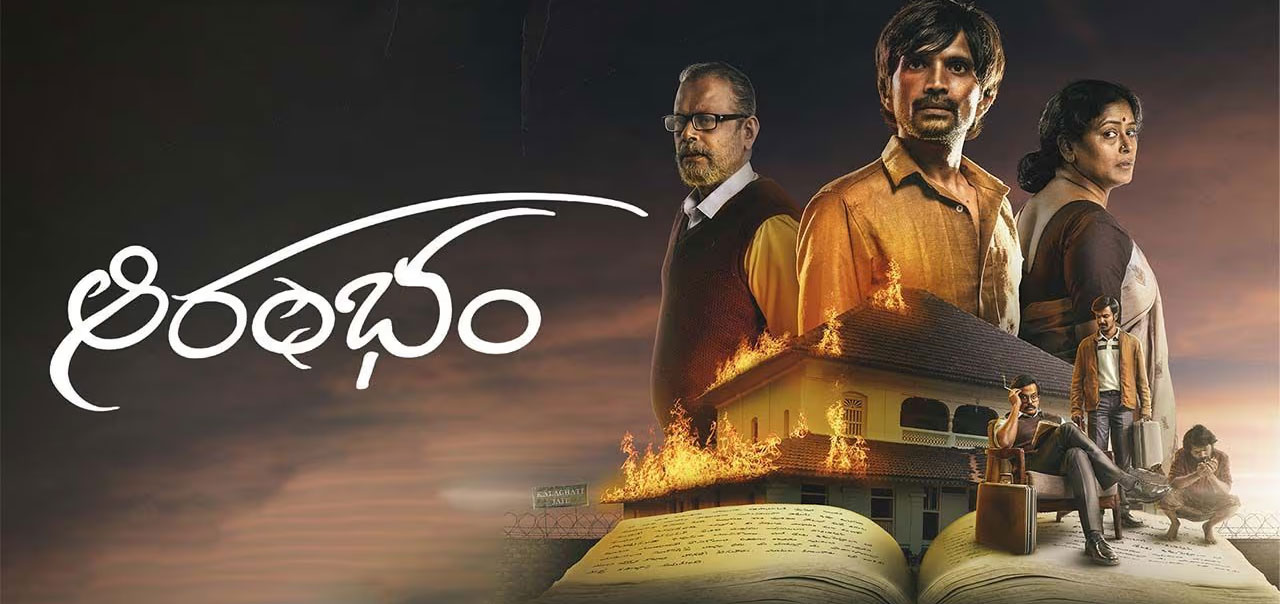Aarambham is an innovative genre-bender with refreshing storytelling, says Srivathsan Nadadhur
That ‘there are no rules in filmmaking’ may be an oft-quoted cliche by thespians, but it’s first-time filmmakers who embrace the idea wholeheartedly. It’s the only phase in life where they’ve got nothing to lose and everything to prove. The list of peripherals may keep expanding with each of their projects and it’s exactly why nothing beats the madness, frolic and innocence of a debut.
Coincidentally, Aarambham signifies the arrival of a new voice in Telugu cinema – Ajay Nag V. Based on a Kannada novel, the film is a low-stakes sci-fi drama revolving around a macabre scientist and his quest to explore deja vu through a perilous experiment. The premise is brought alive with a freshness and child-like enthusiasm that mainstream cinema can only dream of.
Migel (Mohan Bhagat), jailed for murder, mysteriously flees the prison one night, braving past tight security measures. Two private detectives are hired to trace his whereabouts and provide a lead to the cops. Strange truths emerge when they spot a journal and begin questioning an inmate Ganesha. What connects Migel to scientist Subramanya Rao and his life-threatening experiment?
For an ambitious sci-fi film, Aarambham is surprisingly set in a sleepy little town. Migel is so naive in his childhood that he steals a TV antenna from a scientist’s house to attach it to his radio set to view images, which paves the way for their long-lasting association. All that Migel’s mother wants from her son is to spend more time with him, while he squanders his youth in the company of a scientist.
Aarambham begins like an unusual prison-break drama with enough anxiety. It flips expectations while settling into a carefree, idyllic small-town setting, centred on ordinary people with extraordinary ambitions. As you would expect of a debutant fresh out of a film school, its uncorrupted directorial voice is its asset. Narrated across seven chapters, there’s a surprise around every corner.
Beneath its originality, the film has several abstract ideas – some under-explained, some over-explained and simplistic. To explain deja vu scientifically, the characters discuss memory, infinite loop, straight lines and circles. At times, the conversations take a bookish turn and you lose track of the purpose behind the dialogue.
Even with its imperfections, the free-wheeling narrative provides you with a joy you experience with raw beauty; the absence of any indulgent sophistication is its blessing. From the heartfelt performances to the lush green landscapes to the spellbinding use of natural/artificial light and the mellifluous album, you overlook the film’s pitfalls for the team’s effort to craft something so experiential.
While both halves of the film offer contrasting perspectives to a fateful night, Aarambham gets its much-needed emotional depth with a smartly written sub-plot around Migel and his mother Leela. For all its promise of a big reveal, the generic ending is a cop-out to a certain extent. More than its plot, Aarambham is a film you’ll remember for how it made you feel.
After the promise he showed in Care of Kancharapalem, Mohan Bhagat finally gets a film that makes wonderful use of his lanky persona, tapping to his various dimensions as a performer. Bhooshan’s unconventional appearance fits right for his scientist-act while Supritha Sathyanarayan makes her presence felt too.
Ravindra Vijay, Surabhi Prabhavathi, Laxman Meesala provide a strong foundation for the not-so-straightforward story that Ajay Nag V seeks to tell. Cinematographer Devdeep Gandhi Kundu and composer Sinjith Yerramilli do a lot to the elevate the beauty of the film’s dreamy ambience, enhancing its emotional impact. Ajay Nag V is a director who’s here to stay, delivering a film that’s immersive and haunting.
Rating: 3/5













